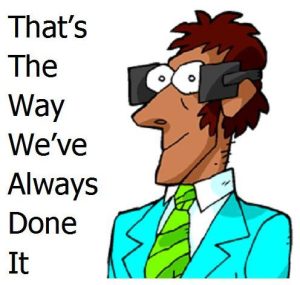If you’ve ever asked a question and gotten the dreaded answer of “that’s the way we’ve always done it,” then your organization could be suffering from what I call TTWWADI syndrome.

Is TTWWADI syndrome holding you back?
Back in the day, the 3 R’s referred to reading, writing, and arithmetic.
In an office afflicted with TTWWADI syndrome, the 3 R’s refer to resistance, reluctance, and refusal.
I’m surprised at how often I run into utilities that are resistant to change. Do any of these situations sound familiar to you?
- Resistance to accepting credit cards
- Reluctance to upgrade to new meter reading technology
- Refusal to consider outsource billing
- Resistance to implementing online bill pay
- Reluctance to offer bank drafts
Is the same old way always the best way?
The TTWWADI syndrome isn’t found only in the failure to take advantage of new technologies. Often, antiquated ways of doing things become institutionalized in organizations to the point they are never questioned.
Sometimes, doing things the same way for years makes sense. But other times, when we stop to think about it, many practices – especially informal processes that have developed over time – no longer serve a useful purpose.
In forward-thinking organizations, questioning why things are done a certain way isn’t chastised, it’s welcomed!
In forward-thinking organizations, questioning why things are done a certain way isn’t chastised, it’s welcomed! If you do something a particular way with no real reason for continuing to do it that way, it behooves you to question why you’re still doing it.
Many times, those closest to a process are oblivious to how redundant or useless it has become. A knowledgeable, objective outsider observing and asking why things are done a particular way can lead to constructive discussions and improvements in how things are done.


